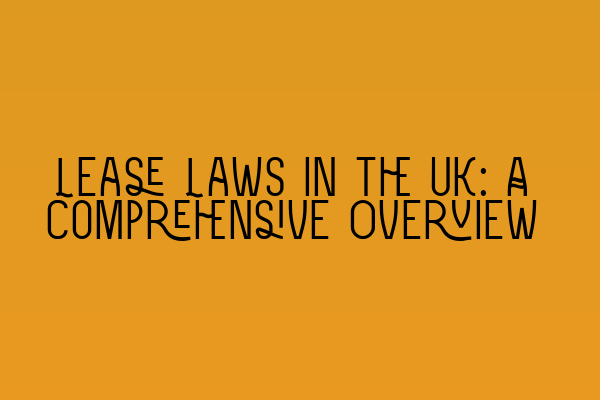Lease Laws in the UK: A Comprehensive Overview
In the United Kingdom, lease laws play a crucial role in the property market, governing the rights and responsibilities of landlords and tenants. Whether you are a landlord seeking to lease your property or a tenant looking to rent a space, understanding the lease laws is essential to ensure a fair and legal agreement. In this comprehensive overview, we will delve into the key aspects of lease laws in the UK, providing you with the necessary insights to navigate through the complexities of leasing property.
### Definition of a Lease
To begin, let’s establish what a lease actually is. A lease is a legally binding contract between a landlord (lessor) and a tenant (lessee) that grants the tenant the right to occupy and use the landlord’s property for a specified period of time, typically in exchange for the payment of rent. The terms of the lease encompass various aspects such as rent amount, duration, maintenance responsibilities, and other specific terms agreed upon by both parties.
### Types of Leases
In the UK, there are different types of leases that can be entered into:
1. Assured Shorthold Tenancy (AST): This is the most common type of residential lease in the UK. It provides tenants with a minimum term of six months, after which it automatically becomes a periodic tenancy unless a new fixed-term agreement is established.
2. Protected Tenancy: This type of tenancy is less common and mainly exists for tenants who have been in occupation since before 15 January 1989. Protected tenants have security of tenure and certain rights under the Rent Acts.
3. Business Lease: Business leases are primarily used for commercial properties. They provide tenants with various rights and protections, including the security of tenure and the ability to renew the lease.
4. Agricultural Lease: Agricultural leases are designed specifically for farming and agricultural purposes. They have their own unique set of regulations and are subject to the Agricultural Holdings Act 1986 or the Agricultural Tenancies Act 1995.
### Key Lease Terms and Conditions
While leases can vary in their terms and conditions, there are several common elements that should be present in every lease agreement. These include:
1. Rent Amount and Frequency: The lease should clearly state the amount of rent to be paid by the tenant and the frequency of payment (e.g., monthly, quarterly, annually).
2. Duration of Lease: The lease should specify the exact duration of the tenancy, including any break clauses or renewal options.
3. Maintenance Responsibilities: The lease should outline the responsibilities of both the landlord and the tenant for property maintenance, repairs, and any associated costs.
4. Deposit: It is common practice for landlords to require tenants to pay a deposit at the beginning of the tenancy as security against potential damages or unpaid rent. The deposit should be held in a government-approved tenancy deposit scheme.
5. Landlord’s Access: The lease should clearly state the landlord’s rights to access the property, including any notice requirements.
6. Termination Clause: The lease should include provisions regarding the termination of the tenancy, including notice periods and any penalties for early termination.
### Landlord’s Obligations
Under UK lease laws, landlords have certain obligations that they must fulfill. These include:
1. Property Maintenance: Landlords are responsible for keeping the property in a good state of repair and ensuring that it meets all safety regulations.
2. Rent Collection: Landlords are required to collect rent from tenants as agreed upon in the lease agreement.
3. Safety and Health: Landlords must provide a safe and healthy living environment for tenants, including complying with fire safety regulations, gas and electrical safety standards, and ensuring adequate heating and ventilation.
4. Security Deposit Protection: Landlords must protect their tenants’ deposits in a government-approved tenancy deposit scheme and provide the necessary information to the tenants within 30 days of receiving the deposit.
### Tenant’s Rights
Tenants in the UK are also afforded certain rights and protections under lease laws. These include:
1. Right to Quiet Enjoyment: Tenants have the right to enjoy the property without interference from the landlord or any other third party.
2. Repairs and Maintenance: Landlords are responsible for carrying out repairs and maintenance on the property, ensuring that it remains in a habitable condition.
3. Privacy: Tenants have the right to privacy in their rented property. Landlords must provide reasonable notice before entering the premises, except in cases of emergency.
4. Protection from Unfair Eviction: Tenants are protected from unfair eviction and have the right to challenge any eviction in court.
### Seek Legal Advice
Lease laws in the UK can be complex, with nuances and specifics that can vary depending on the type of lease and the jurisdiction. Therefore, it is always advisable for both landlords and tenants to seek legal advice to ensure compliance with the law and a fair outcome. SQE Property Law & Land Law offers comprehensive legal services to assist landlords and tenants in navigating lease laws and resolving any related disputes.
For more information on lease laws and other legal matters, please visit our related articles:
– SQE 1 Practice Exam Questions
– SQE 1 Practice Mocks FLK1 FLK2
– SQE 2 Preparation Courses
– SQE 1 Preparation Courses
– SRA SQE Exam Dates
In conclusion, lease laws in the UK play a vital role in safeguarding the rights of both landlords and tenants. By understanding the key aspects of lease agreements, such as the types of leases, crucial terms and conditions, and the obligations and rights of both parties, individuals can ensure fair and legal lease agreements. However, given the complexities and variations in lease laws, seeking professional legal advice and assistance is highly recommended to ensure compliance with the law and avoid any potential disputes.
